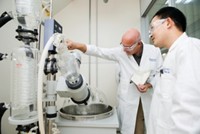Advertisement
Grab your lab coat. Let's get started
Welcome!
Welcome!
Create an account below to get 6 C&EN articles per month, receive newsletters and more - all free.
It seems this is your first time logging in online. Please enter the following information to continue.
As an ACS member you automatically get access to this site. All we need is few more details to create your reading experience.
Not you? Sign in with a different account.
Not you? Sign in with a different account.
ERROR 1
ERROR 1
ERROR 2
ERROR 2
ERROR 2
ERROR 2
ERROR 2
Password and Confirm password must match.
If you have an ACS member number, please enter it here so we can link this account to your membership. (optional)
ERROR 2
ACS values your privacy. By submitting your information, you are gaining access to C&EN and subscribing to our weekly newsletter. We use the information you provide to make your reading experience better, and we will never sell your data to third party members.
Business
Private Equity Targets China
Despite China's poor record of innovation, investors are excited about its potential for research breakthroughs
by Jean-François Tremblay
September 17, 2007
| A version of this story appeared in
Volume 85, Issue 38

There's lots of money to be made investing in obscure life sciences and biotechnology companies in China. That's the view of a few trailblazing professional investors who have already sunk tens of millions of dollars into such companies.
It may seem counterintuitive to invest in China's life sciences industry. The country has never invented a blockbuster drug nor is it known as a producer of innovative products. Moreover, in recent months, confidence in Chinese pharmaceuticals has been shaken by news that drugs made with the wrong ingredients were killing patients in China and abroad.
That's clearly not what investors see in the country's life sciences sector. "There are unprecedented opportunities in China," says Leon Chen, managing director of BioVeda China, a Shanghai-based fund management firm that invests exclusively in Chinese pharmaceutical and biotech companies. BioVeda already has invested $30 million in China, and it is raising up to $150 million more. Chen says BioVeda will have no difficulty finding good Chinese companies in which to pour all this money.
Private equity and venture capital firms invest in a wide range of Chinese life sciences companies. They include contract research organizations, producers of pharmaceutical ingredients and generic drugs, start-up firms working on innovating drugs, and companies that have developed biocatalytic industrial processes.
For some firms, investing in China's life sciences sector has been vastly profitable so far. A professional investor who asked not to be identified because he is in the process of changing jobs says that, in the U.S., private equity and venture capital investors rarely earn more than four to five times their investment. In China, the returns are more like 10 times, and in one case, investors' take was 40 times their original stake, he says.
BioVeda's Chen says many companies have developed technologies with great market potential, but they are short on the capital and management know-how to implement these technologies on a commercial basis. Most Western investors find great Chinese companies "incomprehensible" because the firms fail to highlight the right points.
By contrast, BioVeda claims to have the expertise to accurately predict the future income that could be generated by commercializing technologies invented in China. Chen himself is a native of China who earned a Ph.D. in chemistry from Catholic University of Louvain, in Louvain-la-Neuve, Belgium, and later worked about 15 years in Europe and in the U.S. as a management consultant to life sciences companies.
Chen predicts that one of the companies in which his firm invested will have a value of $1 billion when it is eventually listed on a stock market. The firm, Cathay Industrial Biotech, has developed a process for producing long-chain dicarboxylic acids by straightforward fermentation of long-chain alkanes containing nine to 22 carbons. The traditional chemical method requires eight steps starting from butadiene and can only produce 12-carbon dicarboxylic acid, Chen says.
BioVeda orchestrated a $78 million cash infusion for Cathay, putting in some of its money and raising the rest from local and international investors. The funds enabled Cathay to scale up the technology on its own rather than sell it to a third party, Chen says.
Management advice is a big part of what investors provide to Chinese firms. Michael Hui, chief executive officer of ChemPartner, a Shanghai-based contract research company employing 850 scientists, says he has been talking with several private equity investors to find one that could help "move ChemPartner to the next stage."
Hui explains that ChemPartner has so far been able to finance its operations out of its own cash flow. But sales are doubling annually, he says, and the firm can no longer maintain this fast growth without external cash to increase working capital, buy additional instrumentation, and build new lab space.
More important, Hui says, ChemPartner has so far been managed like a family-owned firm, and it needs to become more professional. He expects the private firm he partners with to advise ChemPartner on how to reorganize its management and prepare for a listing on a stock market.
Morningside Group, perhaps the largest investor in China's life sciences industry, gets intimately involved in managing the companies in which it invests. One of the founders of Morningside, Gerald L. Chan, is a member of the Chan family that founded Hang Lung, a major real estate group based in Hong Kong. Chan, who shuttles between Shanghai, Hong Kong, and Massachusetts, has been a professional investor for 20 years. He received a Ph.D. in radiation biology at Harvard University and did postdoctoral training at Dana-Farber Cancer Institute in Boston.
Whereas Morningside started investing in the U.S. biotech sector in the early 1990s and Chinese Internet companies about 10 years ago, Chan says, the firm began to pay attention to Chinese life sciences only in the past five years.
"When I first started living in China in 1993," Chan recalls, "the life sciences labs were decimated; there was nothing there." But in the past five years, he says, the industry has come to life, primarily owing to the large-scale return of Chinese scientists trained abroad. This is especially true in Shanghai, he notes.
As Chan describes it, Morningside operates what amounts to a virtual drug discovery company working on several compounds simultaneously. Morningside licenses promising intellectual properties from American universities. It then forms companies to perform further development work on the compounds. The drug development work is done in-house, as well as outsourced to contract research organizations in China.
The firms in the Morningside portfolio are typically headed by the original inventors of the compounds. Several of the portfolio companies are housed in Morningside's incubator building in Shanghai's Pudong district. In addition to materially supporting the companies, Morningside works closely with the inventors of the intellectual properties that gave rise to the companies in the portfolio by involving them as advisers or executives. The corporate staff of Morningside includes professionals with U.S. experience in both preclinical and clinical development.
Morningside has yet to bring a drug to market, but that does not worry Chan. One of his drugs is undergoing Phase II clinical trials in Australia, and he expects another will soon gain approval for launch in China. "The portfolio is still young," he explains.
To develop a drug in China, where the cost of research is low, and then launch it in a Western country is the stuff of investors' dreams. To launch it in China is the next best thing because the country is expected to be the world's second largest market for pharmaceuticals by 2020.







Join the conversation
Contact the reporter
Submit a Letter to the Editor for publication
Engage with us on Twitter